翻译批评与赏析概讲课稿
- 格式:ppt
- 大小:756.00 KB
- 文档页数:82
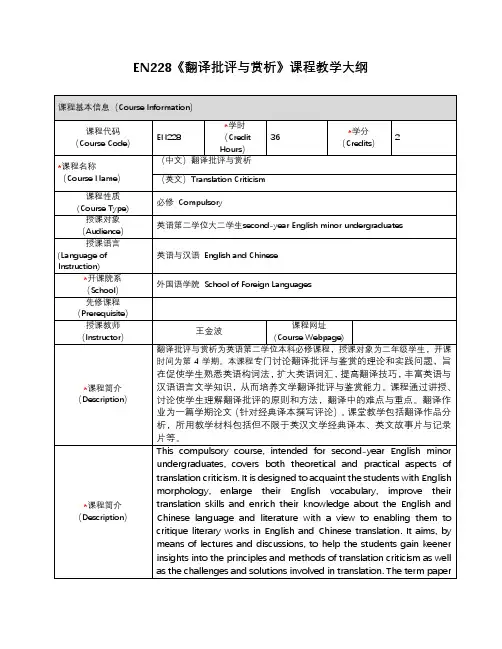
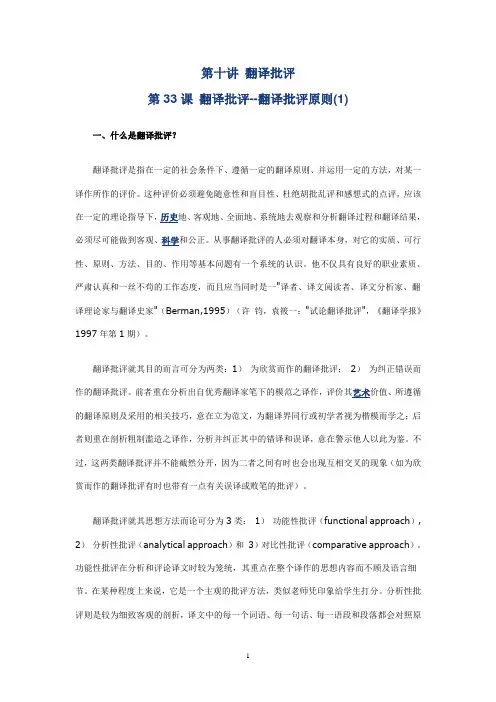
第十讲翻译批评第33课翻译批评--翻译批评原则(1)一、什么是翻译批评?翻译批评是指在一定的社会条件下、遵循一定的翻译原则、并运用一定的方法,对某一译作所作的评价。
这种评价必须避免随意性和盲目性、杜绝胡批乱评和感想式的点评,应该在一定的理论指导下,历史地、客观地、全面地、系统地去观察和分析翻译过程和翻译结果,必须尽可能做到客观、科学和公正。
从事翻译批评的人必须对翻译本身,对它的实质、可行性、原则、方法、目的、作用等基本问题有一个系统的认识。
他不仅具有良好的职业素质、严肃认真和一丝不苟的工作态度,而且应当同时是一"译者、译文阅读者、译文分析家、翻译理论家与翻译史家"(Berman,1995)(许钧,袁筱一:"试论翻译批评",《翻译学报》1997年第1期)。
翻译批评就其目的而言可分为两类:1)为欣赏而作的翻译批评;2)为纠正错误而作的翻译批评。
前者重在分析出自优秀翻译家笔下的模范之译作,评价其艺术价值、所遵循的翻译原则及采用的相关技巧,意在立为范文,为翻译界同行或初学者视为楷模而学之;后者则重在剖析粗制滥造之译作,分析并纠正其中的错译和误译,意在警示他人以此为鉴。
不过,这两类翻译批评并不能截然分开,因为二者之间有时也会出现互相交叉的现象(如为欣赏而作的翻译批评有时也带有一点有关误译或败笔的批评)。
翻译批评就其思想方法而论可分为3类:1)功能性批评(functional approach), 2)分析性批评(analytical approach)和3)对比性批评(comparative approach)。
功能性批评在分析和评论译文时较为笼统,其重点在整个译作的思想内容而不顾及语言细节。
在某种程度上来说,它是一个主观的批评方法,类似老师凭印象给学生打分。
分析性批评则是较为细致客观的剖析,译文中的每一个词语、每一句话、每一语段和段落都会对照原文加以对比和分析,错误的译文被分门别类地挑出来加以评论,并提出改进意见;好的译文挑出来加以褒扬。
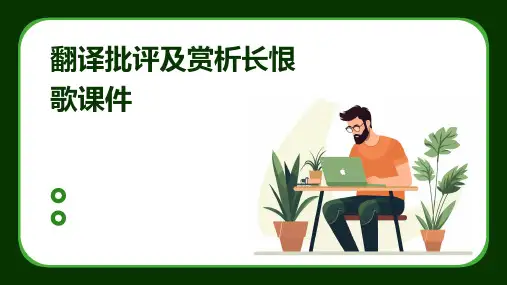
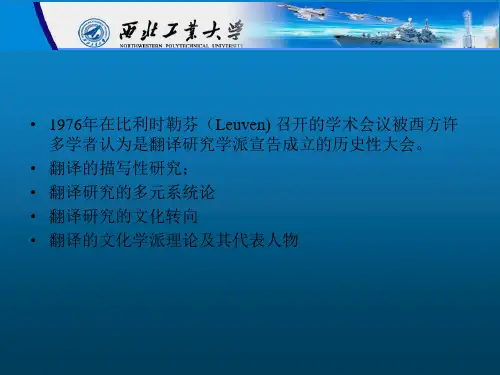
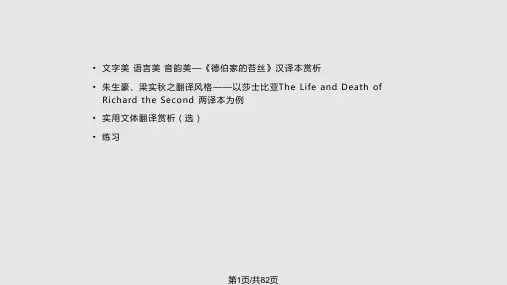
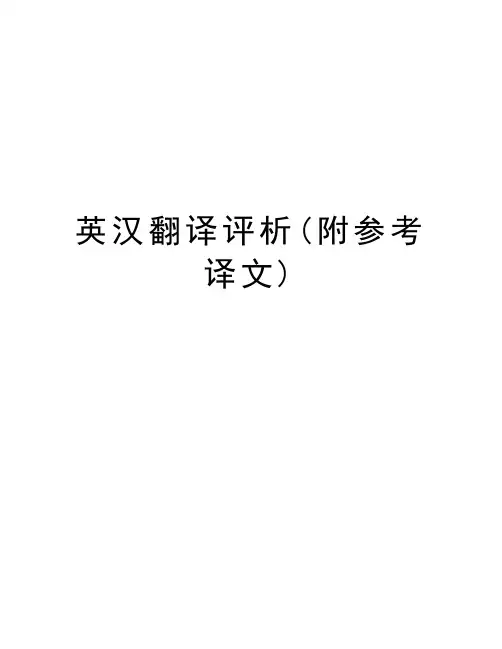
英汉翻译评析(附参考译文)英汉翻译讲解(1)I.英汉之间的差别:“对于中国学生最有用的帮助是让他认识英语和汉语的差别。
”------吕叔湘国内学者的共识是:汉语是综合性的,描写性的,而英语是分析性的,逻辑性的。
在语言学上最重要的区别在于形合和意合的对比(contrast between hypotaxis and parataxis),英语重形合(形式上的融合),汉语重意合(意思或意境的融合)。
在句法方面,有学者形象地把英汉比喻为以下几种:1.雄孔雀/雄狮-----即英语习惯于把最着重的事物放在句首先说出来,开门见山,一语破的,然后再把各种标志一条条补述,一步步交代,慢条斯理,从容不迫,形成一条头短尾长地线性链,象头小尾大地雄孔雀。
而汉语则相反,其线性序列的展开好比画龙点睛,先把外围的环境与衬托一一交代周到,最后点出话语的信息中心,水到渠成,给人以豁然开朗之感,形成雄狮型头大尾小地局式。
例如:I was all the more delighted when, as a result of the initiative of your Government it proved possible to reinstate the visit so quickly.译文:由于贵国政府的提议,才得以这样快地重新实现访问。
这使我感到特别高兴。
又如: The assertion that it was difficult, if not impossible, for a people to enjoy its basic rights unless it was able to determine freely its political status and to ensure freely its economic, social and cultural development was now scarcely (不足地,不充分地;一定不,绝不)contested (斗争;比赛).译文:如果一个民族不能自由地决定其政治地位,不能自由地保证其经济、社会和文化的发展,要享受其基本权利,即使不是不可能,也是不容易的。
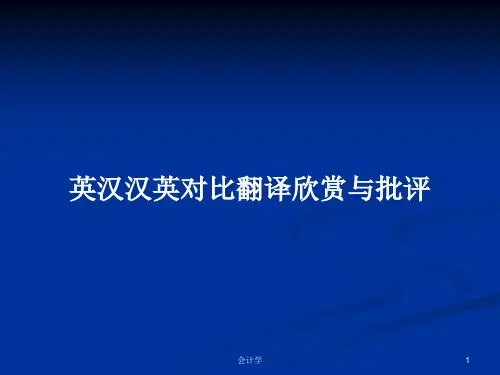
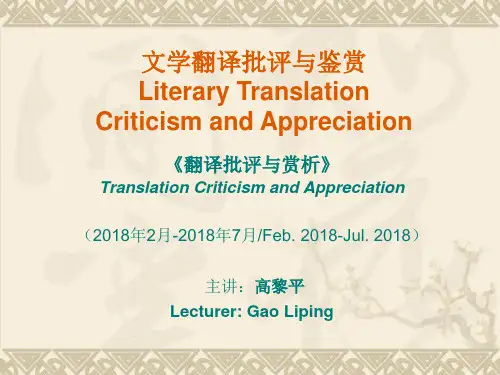
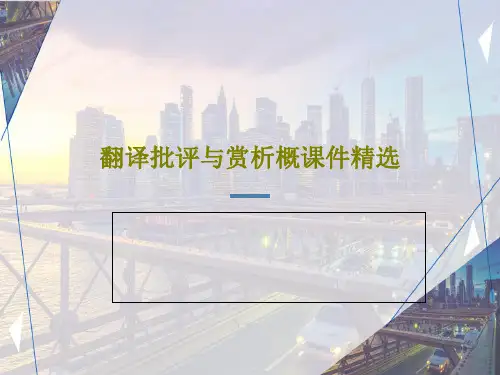
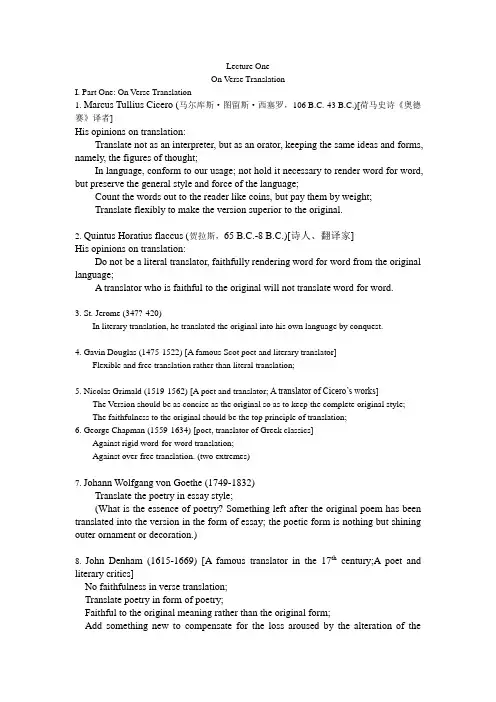
Lecture OneOn Verse TranslationI. Part One: On Verse Translation1. Marcus Tullius Cicero (马尔库斯·图留斯·西塞罗,106 B.C.-43 B.C.)[荷马史诗《奥德赛》译者]His opinions on translation:Translate not as an interpreter, but as an orator, keeping the same ideas and forms, namely, the figures of thought;In language, conform to our usage; not hold it necessary to render word for word, but preserve the general style and force of the language;Count the words out to the reader like coins, but pay them by weight;Translate flexibly to make the version superior to the original.2. Quintus Horatius flaccus (贺拉斯,65 B.C.-8 B.C.)[诗人、翻译家]His opinions on translation:Do not be a literal translator, faithfully rendering word for word from the original language;A translator who is faithful to the original will not translate word for word.3. St. Jerome (347?-420)In literary translation, he translated the original into his own language by conquest.4. Gavin Douglas (1475-1522) [A famous Scot poet and literary translator]Flexible and free translation rather than literal translation;5. Nicolas Grimald (1519-1562) [A poet and translator; A translator of Cicero’s works]The Version should be as concise as the original so as to keep the complete original style;The faithfulness to the original should be the top principle of translation;6. George Chapman (1559-1634) [poet, translator of Greek classics]Against rigid word-for-word translation;Against over-free translation. (two extremes)7. Johann Wolfgang von Goethe (1749-1832)Translate the poetry in essay style;(What is the essence of poetry? Something left after the original poem has been translated into the version in the form of essay; the poetic form is nothing but shining outer ornament or decoration.)8. John Denham (1615-1669) [A famous translator in the 17th century;A poet and literary critics]No faithfulness in verse translation;Translate poetry in form of poetry;Faithful to the original meaning rather than the original form;Add something new to compensate for the loss aroused by the alteration of thetimes, languages, and places.9. Abraham Cowley (1618-1667)[An important poet, critic, and translator; Famous for his translation of pindar’s poems]It’s ridiculous to translate a poem literally;Recreate freely with the original theme to make the version superior or equal to the original.10. Wentworth Dillon, earl of Roscommon (1633-1685)[A poet and translator; His main contribution to translation: translation theory; Essay on translated verse.] Poetry must be translated by poets.A friendly relationship must be set between the original author and the translator; Choose the original materials of his own style to translate;Comprehend the original thoroughly, and be faithful to the essential meaning of the original without addition or distraction.11. John Dryden (1631-1700)Translation is an art;The equivalence of beauty between the original and the version12. Alexander Pope (1688-1744)A translator must be faithful to the original to the most degree;A translator should not try to surpass the original author;Equivalent to the original style;Against literal translation as well as imitation.13. William Cowper (1731-1800)[ A famous translator of Homer’s epics]Against Pope’s free style of wording;A midway between metaphrase and imitation;The highest principle of translation: faithful to the original; tightly close to the original;Against translating Homer’s epic in English rhyme pattern.14. Samuel Johnson (1709-1784)[ poet and critic]Different language is formed with different principle; hence the same expressions of the different languages do not mean the same beauty and grace all the way;The successful translation depends on the choice of the style.15. Pushkin (1799-1837)[The greatest people’s poet in Russia; a prominent representative of Russian literature in 19th century; a verse translator.]A translator must have his own freedom in the choice of original materials;A translator should enjoy sufficient freedom in translation; (imitation and adaptation);A translator must convey the original features as completely as possible.16. Rukovsky (茹科夫斯基,1783-1852)[The first true lyric poet in Russia]A verse translator should have more freedom in translation than an essay translator does; (An essay translator is a slave of the original author, while a verse translator an enemy.)A translator should only translate the original works with the same quality and flavor of his own. (Roscommom)17. Lermontov (莱蒙托夫,1814-1841)[A great poet after Pushkin]Translated freely and creatively to show the representative features of the original; The evaluation of a version depends on the literary value of the version as a Russian literary work.18. Fet (费特)[A typical representative of the pure-art poets]The artistic works have nothing to do with the people;The poetic creation should break away from the vulgar people;The wonderfulness in form cannot be separated from the genius of the work. Translate as literally as possible;19. Theodore H. Savory [A lingual scholar; his major work: The Art of Translation] Translation is an art: Literary translation as painting; scientific translation photography;His 12 descriptive principles on translation:1) A translation must give the words of the original;2) A translation must give the ideas of the original;3) A translation should read like an original work;4) A translation should read like a translation;5) A translation should reflect the style of the original;6) A translation should reflect the style of the translator;7) A translation should read as a contemporary of the original;8) A translation should read as a contemporary of the translator;9) A translation may add to or omit from the original;10) A translation may never add to or omit from the original;11) A translation of verse should be in prose;12) A translation of verse should be in verse;20. 苏曼殊:诗歌之美,在乎气体;然其情思幼眇,抑亦十方同感。
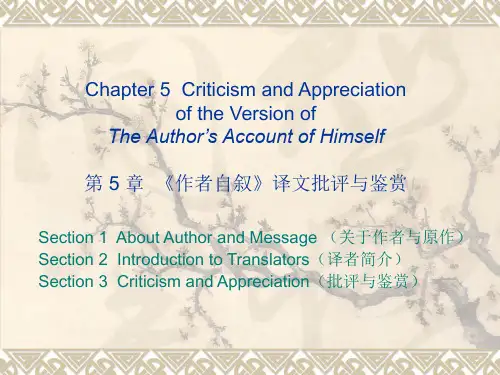
翻译批评与赏析翻译的作品既有批评也有赏析的一面。
批评在评价作品的同时也反映了翻译者对作品的不满之处,赏析则探讨了作品的亮点和其独特的价值。
批评的部分通常集中在作品的翻译质量、表达准确性以及语言的流畅性等方面。
翻译是一项复杂的任务,需要翻译者准确地传达原文的意思,同时还要确保译文在目标语言中的流畅度和可读性。
因此,如果翻译者的译文与原文相比存在明显的错误、不通顺或难以理解的地方,就很可能会受到批评。
对于这些问题,批评文章可能会针对具体的例子进行拆解和讨论,并指出翻译者应该如何改进。
然而,翻译的批评并不仅仅局限于指出问题所在。
批评文章也会探讨翻译作品所面临的挑战以及困难,并分析导致问题的原因。
这种批评不仅为读者提供了对翻译工作的更深刻理解,也可以为翻译者提供改进自己工作的方向和建议。
与批评不同,赏析部分则着重于翻译作品的价值和亮点。
赏析可能从翻译作品的创新性、表达方式、传达感情的能力以及对原著的忠实度等方面进行分析和评价。
赏析不仅关注翻译作品自身的价值,还可以探讨其对文化传播和对读者的影响。
翻译的批评与赏析在一定程度上相互依存。
没有批评的话,赏析可能会变得肤浅,只满足于简单陈述某些翻译作品的好处。
而批评则可以通过指出问题所在,引发深入的讨论和批判性思考,并促使翻译者和读者对翻译作品有更全面的理解。
赏析则可以为翻译者提供积极的反馈和支持,提高他们的工作动力和翻译质量。
总之,翻译的批评与赏析一起构成了翻译作品评价的完整体系。
批评提供了指导和改进的建议,而赏析则赞赏和强调翻译作品的价值。
通过批评与赏析的结合,可以更全面地理解和评价翻译作品,并提高翻译的质量和价值。
“翻译批评与赏析”课程教学大纲一、课程基本信息开课单位:翻译学院课程名称:翻译批评与赏析课程编号:04222148英文名称:Stylistics and Translation课程类型:专业任选课总学时:32 理论学时:8学分:2开设专业:翻译专业先修课程:英汉笔译、汉英笔译二、课程任务目标(一)课程任务本课程是翻译专业学生的基础必修课程,也是学生提高翻译能力的必备课程。
本课程的任务是使学生从应用角度出发,在理论和实践上掌握各类文体的翻译方法的基础上,对翻译文本进行批评和赏析,懂得比较和欣赏译文的多样性,通过欣赏和比较不同译者的对同一原文给的不同译文,进而启发翻译实践,提高翻译能力。
同时,让学生了解开展翻译批评的重要性。
(二)课程目标在学完本课程之后,学生能够:1.掌握翻译批评的基本的理论2.掌握各类文体具体的翻译批评方法3.发现并解决翻译实践中的具体问题4.提高翻译综合能力5.了解翻译批评的重要性三、教学内容和要求(一)理论教学的内容及要求第一章翻译批评与赏析的定义1.理论与实践结合,介绍翻译批评、翻译赏析的定义;2.引导学生了解翻译批评与赏析的概念和重要性。
第四章翻译批评与赏析概论的对象与原则1. 理论与实践结合,介绍翻译批评与赏析的原则、对象;2. 引导学生掌握翻译批评与赏析的内容与原则。
第三章翻译批评与赏析的方法1. 理论与实践结合,介绍翻译批评与赏析的方法;2. 引导学生掌握翻译批评与赏析的各种具体方法及其综合利用。
第四章翻译批评与赏析的标准1. 理论与实践结合,讨论翻译批评与赏析标准的重要性;2. 回顾翻译批评标准,引导学生了解翻译的多样性以及翻译批评标准的多样性。
第五章散文翻译批评与赏析1. 理论与实践结合,引导学生掌握散文翻译批评与赏析的方法;2. 针对具体散文翻译实例,引导学生进行善意、合理的批评与赏析。
第十章小说翻译批评与赏析a) 理论与实践结合,引导学生掌握小说翻译批评与赏析的方法;b) 针对具体小说翻译实例,引导学生进行善意、合理的批评与赏析。
翻译批评与鉴赏Translation Criticism and Evaluation一、课程基本情况课程类别:翻译专业任选课课程学分:2学分课程总学时:32学时,其中讲课:32学时,实验(含上机):学时,课外学时课程性质:专业选修开课学期:笫5学期先修课程:翻译理论与实践适用专业:翻译专业教材:李平、何三宁,《翻译批评与鉴赏》,北京:中央编译出版社,2014年版。
开课单位:语言文化学院英语系二、课程性质、教学目标和任务本课程为翻译专业选修课,本课程以培养学生的翻译鉴赏与批评能力为目标,旨在通过本课程的学习,懂得比拟和欣赏译文的多样性,通过欣赏和比拟不同译者的对同一原文给的不同译文,提高自身的翻译水平,同时让学生了解采用积极的、进取的态度开展翻译批评的重要性。
教学目标:1.通过大量的翻译理论学习与研究,使学生对翻译界存在争议的•些问题有比较明确的认识,树立正确的翻译批评观,学会正确对待翻译珍品中的瑕疵和错误:2.通过对名家译作的比拟与赏析,掌握翻译批评的方法,对译作要从整体上评价,看译者对原作的理解是否正确、译文的表达是否流畅以及能否再现原作的风格等;3.通过理论与实践相结合,提高学生的翻译水平与翻译鉴赏能力。
教学任务:通过教师引导-学生PPT评述-教师点评授课方式,提高学生的翻译理论与实践能力。
三、教学内容和要求第1章引论(6学时)1.1翻译批评入门(2学时)(1)了解课程的基本要求(2)理解翻译的定义、翻译的意义和地位;(3)掌握一些基本概念和思想;重点:翻译批评的定义、翻译批评的功能难点:翻译理论1.2翻译批评的原那么和方法(2学时)(1)了解翻译批评的主体和客体;(2)理解翻译批评的原那么、翻译批评的方法;(3)掌握翻译批评的基本理念;重:点:翻译批评的原那么和方法难点:翻译批评的基本理念13翻译批评史与论(2学时)(1)了解翻译批评的历史和理论;(2)理解中西方翻译家们的一此著名翻译理论;(3)掌握中外翻译家们对翻译标准的不同见解以及可译与不可译、译文可否超过原文等观占. “八、,重点:翻译的不同标准、可译与不可译之争难点:中西翻译理论第2章概念与理论(8学时)2.1翻译鉴赏(2学时)(1)了解如何进行翻译鉴赏;(2)理解翻译鉴赏的原那么和方法;(3)掌握翻译鉴赏的基本理念:重点:翻译鉴赏的原那么和方法难点:翻译鉴赏的基本理念2.2翻译评论(2学时)(1)了解如何进行翻译评论;(2)理解翻译评论的原那么和方法;(3)掌握翻译评论的基本内容和标准;重:点:翻译评论的原那么和方法难点:翻译评论的本质2.3翻译批评(2学时)(1)了解翻译批评的必要性;(2)理解如何对待翻译中的错误;(3)掌握如何写翻译批评;重点:如何写翻译批评难点:翻译批评的模式2.4翻译质量评估(2学时)(1)了解翻译质量评估的基本概念;(2)理解翻译文本的类型与功能;(3)掌握针对不同文本采用不同的翻译批评视角; 重点:文本的类型与功能难点:如何进行翻译质量评估第3章文体与应用(14学时)小说翻译批评与鉴赏(2学时)(1)了解小说的类型(2)理解小说翻译的特点;(3)掌握小说译文的赏析方法;重点:小说的类型及赏析方法难点:如何客观地评论不同译本儿童文学翻译批评与鉴赏(2学时)(1)了解儿童文学的特点(2)理解儿童文学翻译的特点;(3)掌握儿童文学译文的赏析方法;重点:儿童文学的特点及赏析方法难点:如何客观地评论不同译本散文翻译批评与鉴赏(2学时)(1)了解散文的类型(2)理解散文翻译的特点;(3)掌握散文译文的赏析方法;重点:散文的特点及赏析方法难点:如何客观地评论不同译本诗歌翻译批评与鉴赏(2学时)(1)了解诗歌的特点(2)理解诗歌翻译的特点;(3)掌握诗歌译文的赏析方法;重点:诗歌的特点及赏析方法难点:如何客观地评论不同译本科技翻译批评与鉴赏(2学时)(1)了解科技文本的特点(2)理解科技翻译的特点;(3)掌握科技译文的赏析方法;重点:科技文本的特点及赏析方法难点:如何客观地评论不同译本戏剧翻译批评与鉴赏(2学时)(1)了解戏剧文本的特点(2)理解戏剧翻译的特点;(3)掌握戏剧译文的赏析方法;重:点:戏剧的特点及赏析方法难点:如何客观地评论不同译本影视翻译批评与鉴赏(2学时)(1)了解影视的特点(2)理解影视翻译的特点;(3)掌握影视脚本的赏析方法:重点:影视翻译的特点及赏析方法难点:如何客观地评论不同译本第4章课程论文写作规范(2学时)课程论文写作(1)了解课程论文的基本要求(2)理解课程论文的格式、;(3)掌握直接引用与间接引用;重点:课程论文的写作规范难点:选题与论述第5章讨论与总结(2学时)讨论并解答学生在学习过程中遇到的问题,论文选题及引用问题等等。
硕士研究生课程教学大纲《翻译批评与赏析》(英文名称:Translation Appreciation and Criticism)一、课程说明1、课程编码:05511133052、学分:2 学时:363、课程类别:专业选修课4、开课学院:翻译学院5、课程简介:本课程是一门以实践为重点的专业课程,旨在结合学生过去所学过的基本翻译理论和技巧使学生通过本课程的学习,懂得比较和欣赏译文的多样性,通过欣赏和比较不同译者的对同一原文给的不同译文,提高自身的翻译水平。
同时让学生了解采用积极的、进取的态度开展翻译批评的重要性。
6、预备知识:翻译理论与实践、基础口译、基础笔译7、教学目的与要求本课程通过各种文体的翻译批评与实践,提高学生翻译实践能力,使学生能熟练运用翻译原则和不同文体的翻译,要求译文忠实于原语,能够将相关领域的原文表达流畅。
8、考核方法:平时作业(60%)和课堂表现(40%)9、教材及主要参考书教材:李明. 翻译批评与赏析. 武汉大学出版社. 2006.主要参考书:杨晓荣.翻译批评导论.中国对外翻译出版公司,2005.马红军.翻译批评散论.中国对外翻译出版公司,2000.二、教学内容纲要第一章翻译批评与鉴赏概述(学时:4)第一节 20世纪前半期的翻译批评第二节翻译批评与鉴赏的翻译文化理论第三节翻译批评与鉴赏的功能翻译理论第二章翻译鉴赏(学时:16)第一节政论文译作赏析第二节诗歌译作赏析第三节散文译文赏析第四节小说译作赏析第三章翻译批评(学时:16)第五节翻译批评的种类第六节翻译批评目的及其应注意的问题第七节翻译批评的步骤及其实例分析。
《翻译批评与欣赏》教学大纲课程名称:翻译批评与欣赏The Criticism and Appreciation of Translation学分:2 总学时:36课程性质:专业选修课适用研究生专业:翻译硕士(口、笔译)一、课程性质和任务本课程是我校翻译硕士专业选修课,适用该学科的2个方向:口译和笔译。
本课程的任务是:使研究生通过本课程的学习,懂得比较和欣赏译文的多样性,通过欣赏和比较不同译者的对同一原文给的不同译文,提高自身的翻译水平。
同时让学生了解采用积极的、进取的态度开展翻译批评的重要性。
二、教学内容和基本要求(一)翻译鉴赏与批评概述1.充分了解翻译鉴赏与批评的目的和意义,旨在吸取精华,提升自身翻译技能。
2.掌握翻译鉴赏的批准和翻译批评的尺度。
(二)翻译鉴赏1.了解翻译鉴赏的重要性,掌握翻译的鉴赏能力,必须具备较好的英汉语言技能。
2.了解文体差异与翻译的多样性。
3.了解翻译鉴赏离不开翻译理论的指导。
4.了解如何进行翻译鉴赏来提升自身的翻译水平。
(三)翻译批评1.了解翻译批评必须建立良好的翻译理论之上,因为“翻译批评是翻译理论与实践相联系的一个基本环节。
”2.学会翻译分析,依据翻译标准和翻译方法,鉴别译文的优劣,尤其要从跨文化交际效果上探讨译文的好坏。
3.学会多译本评析,了解翻译错误分析的重要性。
4.了解文学翻译批评的意义。
5.了解应用翻译批评的意义及其重要性。
6.了解翻译批评的对象,它不是指译者而是指译文,翻译批评就是品评译文。
7.了解翻译批评的标准,认清翻译标准的相对性和非恒定性。
8.了解并掌握翻译批评的方法。
翻译批评不同于文学批评,但它又不能不借鉴文学批评。
但决不能将翻译批评等同于文学批评。
三、课程学时分配四、其它1、先修课程:无2、教学方法与建议:面授为主、课堂讨论为辅;需用多媒体教室3、考试方式:论文形式为主、平时作业为辅(1)平时作业 30% 期中论文 20% 期末论文 50%(2)理论与实践相结合4、作业要求:习题也是本课程的重要教学环节。